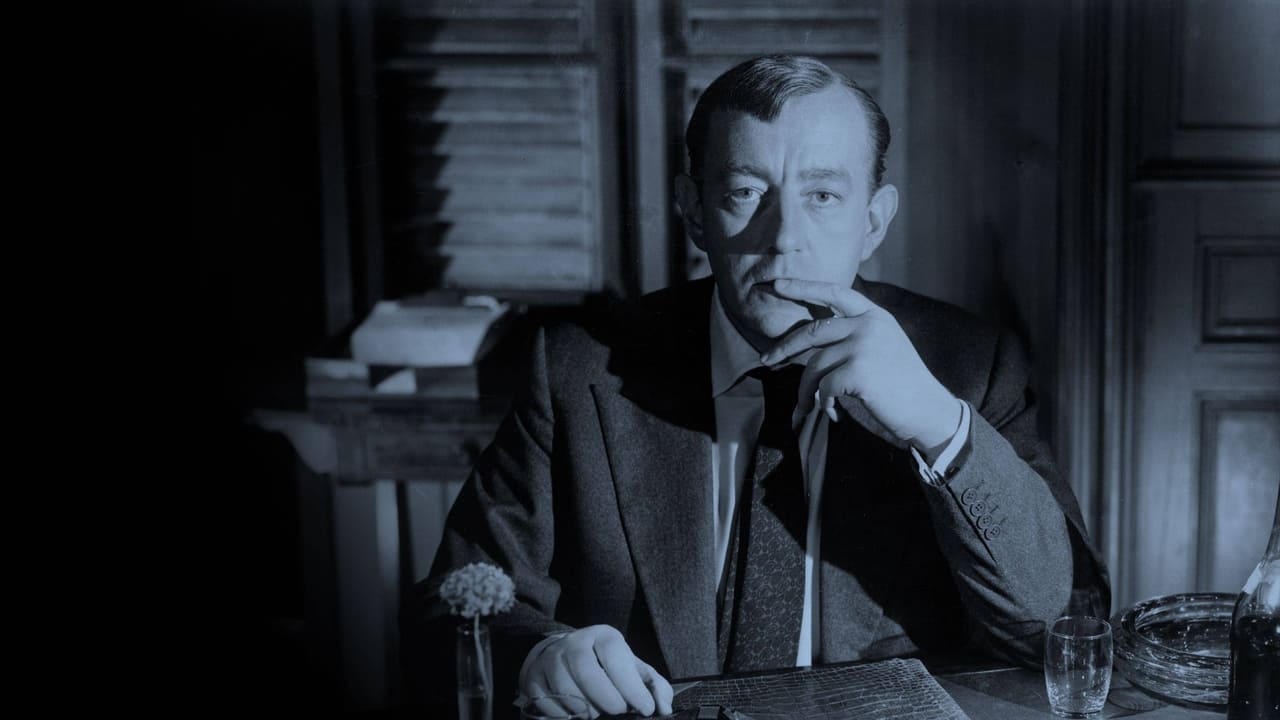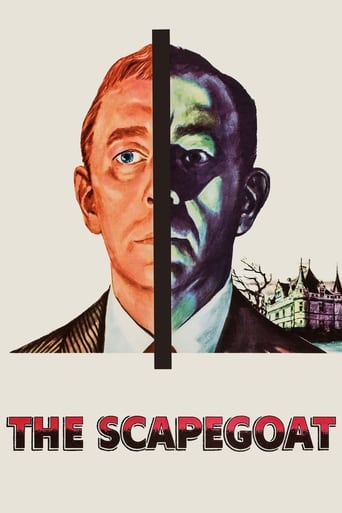

I saw the movie as a great psychological thriller. (It is available on YouTube.) Alec Guinness plays deadpan, dual and twin role of John Barratt and Jacque De Gué. They accidentally meet while John Barratt, a teacher of French in a British school, is visiting Paris and they both realize how similar they look. Jacque, bored and overwhelmed by family dynamics wants out of his own life, drugs John, and replaces John's passport with Jacque's; and John Barratt is forced to take on the role of Jacque De Gué; however much he initially protests, he soon acquiesces to the switch since no one wants to believe the bizarre story of being a replacement.The story worked. The supporting cast were more than adequate to the task. The story line and characters were sufficiently complex to be riveting.But finally, Jacque De Gué reappears. His resolution is to shoot John Barratt dead. Just prior to this, John Barratt had deliberately harmed his right hand to get out of a shooting contest, which would give the game away.So at the end, there is something of a duel with each other; but only one survives. What one survives? One clue is the bandaged hand; but Jacque De Gué could have replicated a bandage on his own hand. To me the telling moment came with the lack at the end of internal monologue/narrative that John Barratt had engaged in as the movie unfolded to explain motivation. That lack seemed to suggest that Jacque De Gué did indeed shoot to death John Barratt. But like all good mystery films, the ambiguity adds to the suspense.
... View More***SPOILERS*** Off the wall but at the same time interesting story about this French/English teacher John Barratt, Alec Guinness, on a vacation in French-just checking out the sites-runs into his double Franch nobleman Jacques De Gue, also played by Guinness, who seems to take a shine to him. Not that George looks just like him but that he want's him to impersonate him while-from what I can see-going on a two month hunting and fishing vacation as well as trying to locate and photograph "Big Foot" in the great Canadian North-West.Getting John drunk and leaving him alone in a hotel room he got for him Jacques checks out and leave the poor and confused John even more confused to face life as Jacques De Gue on his own. Driven to his château in the French countryside by his loyal chauffeur as well as shoeshine boy Gaston, Geoffrey Keen, as hard as John tries to convince his new found family that he isn't Jacques they refuse to believe him even having the family doctor Aloin, Noel Howlett, declare him to be suffering from schizophrenia! Finally accepting his fate as being a rich French nobleman with all the money and fixing that goes along with it John soon finds out that his mom the Countess, Bette Davis, is a morphine junkie and his wife Francoise, Irene Worth, is suspicious that he whats to have her knocked off in order to get his hands on her money. On top of all that his or better yet his wife's glass factory is on the verge of bankruptcy which he doesn't help by him promising the workers there a hefty raise in their next contract.***SPOILERS*** All this confusion soon comes together when Francoise is thrown to her death out of her two story bedroom window at the château with John herd but not seen arguing with her before her death just moments before it happened by his sister Blanche,Palela Brown,who overheard the conversation. It now becomes apparent that the missing Jacques was behind his wife's murder and used the totally out of touch Jack who was nowhere near the murder scene and had proof of having driven with Gaston down to the town of Villars to go sightseeing at the time of the murder! The ending is a bit crazy with, this by now is getting so confusing, Jacques now coming out of the shadows trying to reclaim his identity from John who's, by having a taste of the good life, now not at all willing to give it up. P.S The only way were able to destinies between the two John & Jacques at the final moment of the movie is a bandage or dressing covering the right hand of one of them that if you blinked or fell asleep by then you'll miss it!
... View MoreI read the book years before I saw this on TCM; the book is a typical Daphne duMaurier shaggy dog story with plenty of intrigue but no satisfactory resolution. The film is faithful to the book in that way, and it might have been far more effective to dispense with the (albeit well done) melodramatic dual character scene at the end and resolve it another, more ambiguous way. There's plenty in The Scapegoat of interest otherwise; a sprawling château to die for, an amazing car, supporting stiff-upper-lip Brit cast pretending to be Franch aristos pitching the scenery-chewing just right, and Bette Davis, presumably in the days she couldn't get arrested in the States, being as John/Jacques says, 'sulphurous'. If you catch it, try to work out whether all the cars are (UK-style) right-hand drive or not. BTW, my EX father-in-law George Lloyd was the man who made the caged-bird musical box. A real shame about the 'with one bound, he was free' ending.
... View MoreAs part of a birthday celebration of the late Sir Alec, TCM placed this seldom shown character study in between two hilarious Guinness farces, "Hotel Paradiso" and "All at Sea." In combination with "The Malta Story," "Scapegoat" allowed Guiness to indulge both his more serious dramatic inclinations as well as play another double role, something for which he was a master. His "Kind Hearts and Coronets" is the tour de force of this genre of multiple identities.This adaptation of Du Maurier's novel has also the advantage of five strong female leads, three of them, Bette Davis, Irene Worth and Pamela Brown, known in their own right for their dramatic achievement. Actually, all of the supporting roles are excellently cast, even to the faithful manservant, Gaston, and especially the count's precocious and very articulate daughter. Bette Davis, as the matriarch, sets the tone for neurotic tyranny in this family; but it is a role that could have been less of a caricature if Dame Wendy Hiller had played it instead (See Dame Wendy in "Murder on the Orient Express" for the epitome of "noblesse oblige.") In the role of the wife, Irene Worth gains some of our sympathy as the high-strung and beautiful, sensitive but persecuted spouse unable to give the count a male heir. Her mobile and expressive face is a perfect foil to Guiness's stoic reserve. As the count's sister, Pamela Brown's natural reticence and grave air, her huge luminous eyes and rich voice (which can be savored in an earlier role in "I Know Where I'm going") made her a likely choice in the role of a sibling, however, the differences she shares with her brother are not resolved nor explained, neither is her motivation for being so antagonistic toward him. In other words, through the eliptical, somewhat ambiguous dialogue, there is a history or subtext of sibling rivalry of which we must remain ignorant. (Perhaps the novel delineated this more clearly.)Despite the strong and balanced cast, I found the ending a surprise and a slight disappointment. For me it failed to resolve Guiness's relationship with the other females save one, his lover. Therefore, despite the putative attempt to plumb his character, it remained an identity problem hardly more than skin deep. Still, all in all, it is a fascinating attempt and a rare chance to see Guinness in a noncombative drama with strong females, somewhat like a diamond set among a ruby, emerald and pearl.Of four stars, definitely a strong three*** for the excellent cast.
... View More